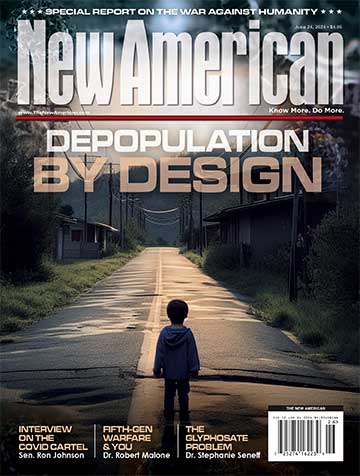
Last weekend in Chicago, nearly 50 people were shot, one fatally — a typical weekend in the Windy City. That might be one reason the Democrat-controlled Illinois Senate didn’t see much newsworthy about the bloodbath.
Thus, instead of passing a bill to crack down on crime, it passed HB4409, which sailed through the Land of Lincoln’s House last month.
The bill does nothing to address crime in the City of Big Shoulders. Instead it changes the word for criminals in a state rehabilitation program from “offender” to “justice-impacted individual.”
Such was the incandescent idiocy of the change that even the hard-left Chicago Tribune opposed it.
The Bill, the Reaction
The bill changes the term for the purposes of Adult Redeploy Illinois (ARI), another leftist crime-fighting plan that suggests the triumph of hope over experience.
The ARI program was created with the state’s Crime Reduction Act of 2009, and will “provide financial incentives to local jurisdictions for programs that allow diversion of individuals from state prisons by providing community-based services,” the official web page says.
“ARI provides grants to counties, groups of counties, and judicial circuits to increase programming in their areas, in exchange for reducing the number of people they send to the Illinois Department of Corrections,” the web page continues. “The Crime Reduction Act is based on the premise that crime can be reduced and the costs of the criminal justice system can be controlled by understanding and addressing the reasons why people commit crimes.”
So now the state won’t call the criminals it doesn’t send to jail “offenders.” “Justice-impacted individuals,” again, is now the correct term.
The bill’s sponsor in the House, Democrat Kelly Cassidy, explained the measure. “So, carrying a label of offender for life does not seem appropriate for a system in which we intend to return people to full participation in society,” she said.
One senator called it “good public safety policy.”
Understandably, even the Tribune’s scriveners are skeptical.
“Right-wing Twitter sure went to town with ‘justice-impacted individual’ this week, it being the kind of clueless phraseology that positively invites ridicule,” an editorial began. “Gov. J.B. Pritzker would be wise to strike it when it hits his desk before even more reputational damage is done to the state of Illinois.”
The bill is “gift-wrapped” for Republicans, the editorial said, and “it feels like the state is suggesting that offenders can offend with impunity.”
Indeed, “justice-impacted individual sounds to us more like a description of someone who is the victim of a crime than someone who committed one,” the editorial continued, which didn’t omit a slap at GOP presidential candidate Donald Trump:
Orwellian language has become a progressive favorite of late (see Joe Biden’s “Inflation Reduction Act,” a name designed to distract from the clear reality that it was actually helping fuel inflation). This one puts us in mind of Orwell’s communist allegory “1984” wherein the prescient author described a repressive society that strove to “deny the existence of objective reality and all the while to take account of the reality which one denies.” As a result, Orwell wrote in his brilliant description of what he called doublethink, “the lie is always one step ahead of the truth.” Democrats don’t have a monopoly on doublethink: Supporters of Donald J. Trump should also be familiar with the term. But this kind of language manipulation is still pernicious.
The grammatical syntax is ridiculous too. Justice is a thing you seek, a societal goal, if you will. It’s true that we have a United States Department of Justice, but that’s a reference to what that agency is supposed to achieve. To say that a particular person is “justice-impacted” is gobbledygook given that we’re all justice-impacted individuals. Or so we hope.
Plus, justice is not some cohesive entity that “impacts” people like, say, crime or poverty. It’s all nonsense.
The editorial warned that Pritzker had better veto the stupid bill or face a “potential Willie Horton-style campaign.”
In 1988, campaign advertisements made Horton, a rapist and murderer, the unintended star of the presidential race between Republican Vice President George H.W. Bush and Democrat Michael Dukakis. While on furlough from prison in Massachusetts, Horton brutally raped a woman in Prince George’s County, Maryland, after he stabbed and pistol-whipped her fiancé.
Apropos of the Tribune’s concern about “Orwellian language,” sponsor Cassidy is a lesbian with purple hair who thinks she is “married” to a woman.
“Right-wing Twitter”
The editorial was right about one thing. “Right-wing Twitter” did indeed have a good time heaping richly deserved ridicule on the bill.
“Yes this is real,” The Rogue Politico wrote:
They’re no longer rapists, criminals, offenders, pedophiles, or abusers.
Day by day democrats are doing their best to normalize being a criminal in America.
Wrote LocutusOfBorg, “Well, this idea should bring a screeching halt to crime in Illinois!”
“The left’s continuous ‘euthanization of our language’ is straight out of the Marxist/Maoist Playbook!” another user wrote.
As for crime in Chicago, last weekend’s 31 shootings left 45 victims with bullet holes. A mass shooting at about 10 p.m. on Saturday wounded six.
Add another several dozen “justice-impacted individuals” to the growing list who will never see the inside of a prison cell.
As of today, just 145 days into the year, 174 people have been murdered in the city, the Chicago Sun-Times homicide counter reports — 155, or 90 percent, were shot.
Instead of calling them crime victims, the Illinois Democrats can call them “bullet-impacted individuals.”



